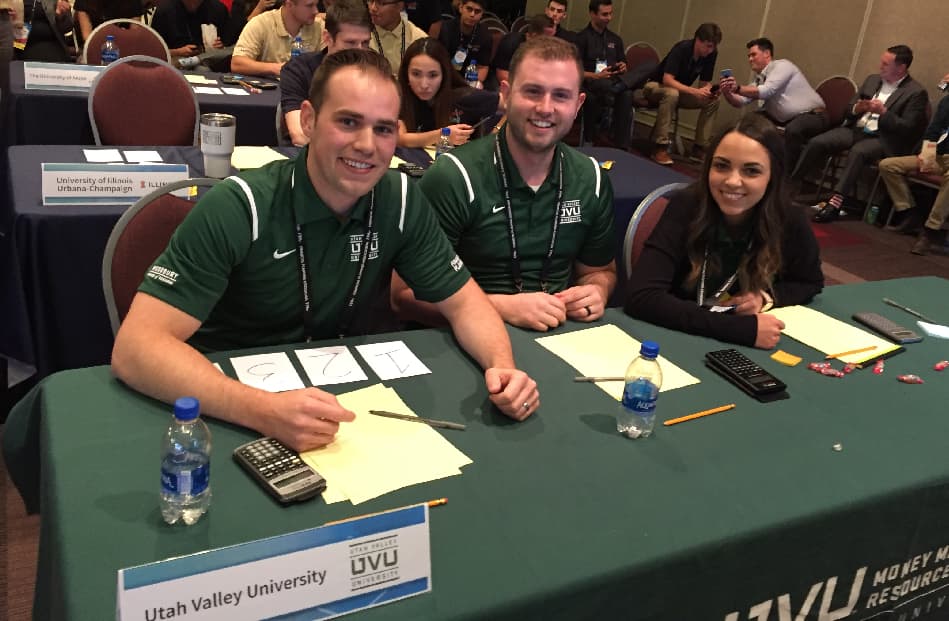From left, Utah Valley University students Colton Peck, Doug Macdonald and McKenna Jacobsen. Together, they took first place in the Financial Planning Challenge at the Financial Planning Association’s annual conference in Minneapolis last week.
Utah Valley University
When Colton Peck started school at Utah Valley University, he was set on being an accountant.
But after taking a few accounting courses, he realized he did not like it. Then, he saw a presentation on the school’s personal financial planning program and decided to give it a shot.
“I took the intro to financial planning course and absolutely loved it,” Peck said. The career, he said, includes one important element that accounting didn’t: the ability to help people.
Now, Peck, 23, will be graduating in December with a degree in personal financial planning and plans to continue to work at Utah-based Zions Bancorp as a wealth planner.
Peck said he discovered the career by coincidence. He’s not alone.
More from FA Playbook:
Fisher Investments withdrawals top $2B as pension plan exits
Raymond James moves to free trades for some advisors
How advisors need to change to succeed in the next decade
New research from TD Ameritrade Institutional found that one thing typically gets in the way of more people training to become financial planners: They do not know about it.
While just 37% of students surveyed are aware of the profession, 63% said they might be interested in it after they found out more about it, according to the research.
With about 40% of financial advisors planning to retire in the next 10 years, according to Cerulli Associates, spreading the word about could help stem the coming talent shortage.
“They don’t know that the [registered investment advisory] industry exists,” said Kate Healy, managing director of Generation Next at TD Ameritrade Institutional. “So much of this is about the blocking and tackling of raising awareness.”
Getting the word out
So far, awareness has traveled the old-fashioned way: by word of mouth.
McKenna Jacobsen, a 23-year-old senior at Utah Valley, knew about the business growing up because her father is a financial planner. And she says she is certain to pass on her love for her major to other students, which she can do as the recruiting officer for the school’s Personal Financial Planning Student Association.
“I kind of just bug everybody about it until they realize how awesome it is,” Jacobsen said.
“It’s super flexible. You get paid well. You’re helping people. It’s a perfect combination,” she said of her major’s selling points.
Luke Dean, associate professor of personal financial planning at Utah Valley, said he uses a similar pitch to attract more students.
Weekly advice on managing your money
Get this delivered to your inbox, and more info about about our products and services.
By signing up for newsletters, you are agreeing to our Terms of Use and Privacy Policy.
“We say ‘just take one class,'” Dean said. “Even if you decide not to do the major, you learn how to manage your own personal finances, which you need no matter what your plan is.”
Now, Utah Valley’s financial planning program, which is eight years old, has about 500 undergraduates who’ve declared it as their major, according to the most recent count. That makes it one of the largest undergraduate programs in the country.
However, the current number of schools and graduating students nationwide will not be enough to fill the gap, according to Healy.
More colleges, including Rutgers University in New Brunswick, New Jersey, and Delaware State University have added programs in recent years.
And they need support to grow.
How advisors can help
That’s where financial advisors, who are already working in the field, can help, Healy said.
Healy recommends that advisors visit local colleges and help spread the word.
That doesn’t necessarily have to be a school with a financial planning program. “They can go back to their alma mater and help get one started,” Healy said.
Another way advisors can help is by showing up at career fairs and other events.
“People need to know you care, so you need to be there consistently,” Healy said. “Buy the kids a pizza lunch and talk about your job.”
Another way advisors can give back is by establishing an internship program at their firm.
“It’s such a little amount of money” to hire interns, Healy said. “[You’d] also be shocked at how much work they can do for you.”
That can include everything from helping transition to a new customer relationship management system, run events or take on special projects that advisors don’t have time for, she said.
For students like Doug Macdonald, 25, who recently graduated from Utah Valley, those temporary stints can lead to full-time employment. Macdonald is now working as an associate advisor at insurance and benefits broker Hub International, which has offices across the country, building on a previous internship there.
“I like being able to sit down with somebody, have them express their concerns, and see if I can come up with a solution,” Macdonald said.
